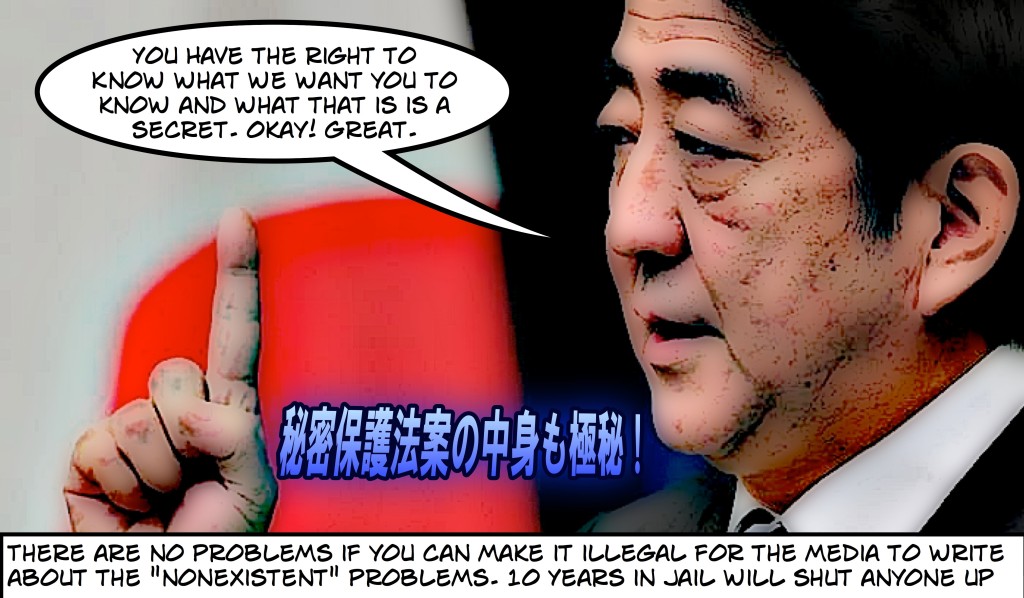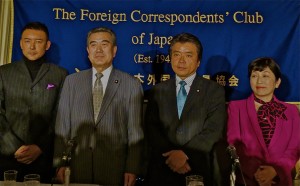A committee within Japan’s lower house is currently deliberating a new bill that will punish leakers of designated “special” state secrets. The LDP Cabinet recently approved a bill to punish civil servants, lawmakers, and journalists who leak information that it deems will harm national security. The government will be able to determine what they will call “special secret”— almost without limit— because the definition of these possible secrets are “too broad and vague”, according to critics of the new bill. The Abe administration says that the secrecy bill is necessary to protect sensitive information given to Japan by the United States and other foreign countries.


Four lawmakers from four different political parties, briefed reporters today on the dangers of the Designated Secrets Bill at the Foreign Correspondents Club of Japan (FCCJ). Earlier this week, the FCCJ issued a strong statement of opposition to the bill as well.
Mizuho Fukushima, leader of the Social Democratic Party and wife of a famous anti-nuclear lawyer explained, “This bill represents a great threat to journalism.” A citizen or journalist investigating an arbitrarily declared state secret who reveals it could be prosecuted and jailed for up to 10 years. “The criteria for prosecuting an individual are too vague,” she added. “If a journalist or a member of an NGO accidentally overheard a state secret, he/she would be prosecuted.” Fukushima explained that if a lawmaker got hold of a state secret and wants to reveal it, he/she could also be prosecuted.
“A citizen or journalist investigating an arbitrarily declared state secret who revealed it could be prosecuted and jailed for up to 10 years.”
Article 19, an organization based in the U.K. and the Foreign Correspondents Club of Japan have both issued a declaration earlier this week to urge Japan’s National Diet to reject the pending Secrecy Bill, as it “unreasonably” violates international standards on freedom of expression and the right to information.
The FCCJ statement admonished the Japanese government that investigative journalism is “not a crime, but rather a crucial part of the checks-and-balances that go hand-in-hand with democracy.” Fukushima added that from the standards of the international community, the drafted Japanese bill has too many flaws. Freedom and human rights were suppressed under Japan’s military government’s rule before and during World War II, she pointed out, and discussed how this bill represents a regression for Japan. As the definition of secrecy is “too vague,” there would be a possibility that the government haphazardly restricts the general public’s knowledge by designating anything embarrassing for the ruling powers a “state secret.”
Sohei Nihi, from Japan’s Communist Party said that the “most dangerous aspect of this bill” is that the average person will not be informed that a particular piece of information has been designated as a secret. “The Japanese people would be ignorant of these secrets and the bill will lead to a general suppression or reluctance of people to seek for information, ” he added. Considering the huge amount of opposition to this bill, the ruling party inserted a clause, which says that “there will be due consideration given to people’s right to know and journalists’ right to research and seek information.” However the seeking of information will have to be done in an “appropriate manner,” (正当な行為) and it is questionable and unclear by who and how will this “appropriate manner” be determined. As a result of some deliberation within the Diet committee, it was decided that the courts would make the fundamental decisions and the individual targeted could be subject to arrest and interrogation before a case is even brought to court. In effect, the law will work as presumed guilty until proven guilty.
The “most dangerous aspects of this bill” is that the average person will not be informed that a particular piece of information has been designated as a secret
Of course, exceptions would be made to individuals not aware of holding information classified as a state secret who make it public. “This sounds good in theory but who and how will it be determined that the leaker really wasn’t aware in advance before disclosing a state secret?” Sohei Nihi pointed out. “The government could force the individual to confess, as this kind of practice has taken place in Japan in the past,” he added. Ryo Shuhama, member of the upper house and representative of the People’s Life Party said that the general public was seriously concerned about this bill. According to some newspapers polls about 30% of the Japanese population favor the bill, 42% are against the bill, 68% have concerns over the definition of “secrecy” could be eventually expended, and 64% feel that this bill should not be passed in this current Diet session.
Taro Yamamoto, actor turned lawmaker last summer, is well known for his anti-nuclear stances and his audacious behavior. Yamamoto breeched imperial etiquette last month by handing a letter to the Japanese emperor in the middle of a royal garden party to which he was invited. Yamamoto, who was one of the first politicians to point out the harms of the secrecy bill even before it changed its name from “secrecy preservation law” to “secrecy law,” said that the bill is basically already in effect. He explained a situation in which the authorities told him that information regarding nuclear facilities exported to Vietnam could not be revealed. According to Yamamoto, the government spent the equivalent of 2.5 million dollars in securing a deal to export nuclear technology to Vietnam—tax money that was taken out of the reconstruction budget for earthquake and nuclear accident ravaged northern Japan.
“There is already a great deal of secrecy preservation in Japan,” he said. Yamamoto said that the government is truly trying to increase the power of the state and that the secrecy bill will eventually lead to the oppression of the average person and freedom of expression. “The path that Japan is taking is the recreation of a fascist state. I strongly believe that this secrecy bill represents a planned coup d’état by a group of politicians and bureaucrats,” he warned.
The secrecy bill has been compared to the peace preservation law (治安維持法) that passed in the period before World War II. Mizuho Fukushima explained that when that law passed it was not considered to be a frightening or threatening law. However, once people started to be arrested, it had a chilling effect on media, citizens’ groups and the general population. During the military rule and the war years in Japan, laws and rules were strengthened so that towards the end, it is said that even weather reports were considered state secrets. There was a famous case involving a young student in Hokkaido (the Miyazawa case) who happened to reveal the location of a particular airport to a foreigner and was sent to prison for divulging a state secret. “Once you open the door to such kind of laws, the government will have the right to designate anything as a state secret and by speaking about it or mentioning it, you can be arrested and prosecuted.” Fukushima explained, “Especially during war time, it was very difficult for defendants and lawyers to fight their court cases, because they were not told what exactly what was the state secret that they had been accused of having revealed.” she added.
“The path that Japan is taking is the recreation of a fascist state. I strongly believe that this secrecy bill represents a planned coup d’état by a group of politicians and bureaucrats”

[…] “What are the criteria of these possible secrets?” “Well…it’s a secret… (japansubculture.com) […]
Why users still make use of to read news
papers when in this technological globe everything is presented on net?